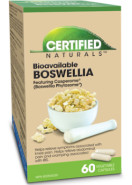Herbal Supplements
Top Herbal Supplements & How They Support Your Health
Medicinal herbs are natural substances derived from various parts of plants, such as leaves, roots, bark, flowers, and seeds, that have been used for centuries for their robust therapeutic properties. These herbs have played a significant role in the history of medicine and this list of medicinal herbs continues to be an essential component of traditional and alternative healing practices worldwide. Read more >-
 Certified Naturals Bioavailable Boswellia contains the patented bowellia Phytosome® known as Casperome®. Casperome® Boswellia has shown that it has significantly improved absorption as well as absorbed quicker to deliver quicker pain relief. Casperome® also remains in the system longer. Bioavailable Boswellia helps to relieve a variet...Certified Naturals Bioavailable Boswellia contains the patented bowellia Phytosome® known as Casperome®. Casperome® Boswellia has shown that it has significantly improved absorption as well as absorbed quicker to deliver quicker pain relief. Casperome® also remains in the system longer. Bioavailable Boswellia helps to relieve a variety of pain including joint pain, sprains, IBS (irritable bowel syndrome), tensonitis and asthma. [VCAPS]+ Earn 33 Reward Points
Certified Naturals Bioavailable Boswellia contains the patented bowellia Phytosome® known as Casperome®. Casperome® Boswellia has shown that it has significantly improved absorption as well as absorbed quicker to deliver quicker pain relief. Casperome® also remains in the system longer. Bioavailable Boswellia helps to relieve a variet...Certified Naturals Bioavailable Boswellia contains the patented bowellia Phytosome® known as Casperome®. Casperome® Boswellia has shown that it has significantly improved absorption as well as absorbed quicker to deliver quicker pain relief. Casperome® also remains in the system longer. Bioavailable Boswellia helps to relieve a variety of pain including joint pain, sprains, IBS (irritable bowel syndrome), tensonitis and asthma. [VCAPS]+ Earn 33 Reward PointsSale: $33.99
Reg.: $39.99 (Save $6.00)
In Stock
Top List of Medicinal Herbs
Medicinal herbs are natural substances derived from various parts of plants, such as leaves, roots, bark, flowers, and seeds, that have been used for centuries for their robust therapeutic properties. These herbs have played a significant role in the history of medicine and this list of medicinal herbs continues to be an essential component of traditional and alternative healing practices worldwide. Traditional Chinese Medicine (TCM) and Ayurvedic medicine in India are two of the most well-known systems that incorporate medicinal herbs into their holistic healing principles, focusing on restoring balance (homeostasis) and harmony within the body.
Early humans relied on their observation of nature to discover the healing properties of plants. This knowledge was passed down through generations, leading to the development of traditional herbal medicine systems in different cultures across the globe. Indeed, ancient civilizations, such as the Egyptians, Mesopotamians, Chinese, and Indians, had extensive knowledge of medicinal herbs. They documented their findings in written records, including papyrus scrolls, stone tablets, and ancient texts. For example, the Ebers Papyrus, an Egyptian medical document dating back to around 1550 BCE, contains detailed information about various herbal remedies, showcasing the Egyptians' advanced understanding of medicinal plants.
The Greeks, especially figures like Hippocrates and Dioscorides, contributed significantly to the study of medicinal herbs. Hippocrates, often regarded as the father of modern medicine, emphasized the importance of natural remedies and documented numerous plant-based treatments. Moreover, Dioscorides, a Greek physician and pharmacologist, authored "De Materia Medica," a comprehensive text that catalogued over 600 medicinal plants, their uses, and preparation methods. The Romans, too, adopted and expanded upon this knowledge, incorporating it into their medical practices.
Medicinal Herbs and Modern Science
The Age of Exploration brought about the discovery of new medicinal herbs as European explorers travelled to distant lands. Plants like quinine from the cinchona tree, which proved effective against malaria, and various herbs in the Americas further enriched the global pharmacopeia.
List of The Best Medicinal Herbs
Thousands of medicinal herbs have been identified and used in myriad therapeutic applications throughout history. Below are some is a list of the most recognized and popular medicinal herbs that are still widely used today:
Aloe Vera (Aloe barbadensis miller) - Known for its soothing properties, it is often used for skin ailments and burns.
Ginger (Zingiber officinale) - Used for digestive issues and to alleviate nausea.
Turmeric (Curcuma longa) - Contains the active compound curcumin, known for its potent anti-inflammatory properties.
Echinacea (Echinacea purpurea) - Offers immune system support and fights off colds.
Peppermint (Mentha × Piperita) - Helps with digestion and can relieve headaches and migraines.
Lavender (Lavandula angustifolia) - Provides calming effects and is often used in aromatherapy.
Chamomile (Matricaria chamomilla) - Has calming properties and is used to ease anxiety and sleep disturbances.
Garlic (Allium sativum) - It is revered for its powerful cardiovascular benefits and immune-boosting properties.
Ginseng (Panax ginseng) - An adaptogenic herb known for its energy-boosting effects.
St. John's Wort (Hypericum perforatum) - Used to alleviate symptoms of mild to moderate depression and anxiety.
Milk Thistle (Silybum marianum) - Supports liver health and helps optimize liver function.
Valerian (Valeriana officinalis) - A natural remedy for insomnia and anxiety.
Saw Palmetto (Serenoa repens) - Often used for prostate health and urinary tract issues.
Ginkgo Biloba (Ginkgo biloba) - Supports cognitive function and circulatory health.
Arnica (Arnica montana) - Used topically for pain relief and reducing bruising.
Rosemary (Rosmarinus officinalis) - Known for its cognitive and memory-enhancing effects.
Nettle (Urtica dioica) - Used for its anti-inflammatory properties and for alleviating allergies.
Holy Basil (Ocimum sanctum) - An adaptogenic herb that reduces stress and anxiety.
Feverfew (Tanacetum parthenium) - Used to prevent and alleviate migraines.
Cayenne Pepper (Capsicum annuum) - Contains capsaicin, which provides pain relief and improves circulation.
How To Use Medicinal Herbs
The list of medicinal herbs can be prepared as teas or infusions, allowing for a soothing and flavourful way to ingest their healing properties. Tinctures, extracted in alcohol or glycerin, offer a concentrated and easy-to-dose solution. Capsules and tablets are convenient for those who prefer a more standardized and easily transportable option. Creams and ointments enriched with herbal extracts can be applied topically for targeted relief. Additionally, herbs can be incorporated into culinary creations, adding both flavour and health benefits to dishes. With such versatility, it's easy for just about anyone to partake in the holistic healing benefits of medicinal herbs.
Shopping For Herbal Supplements
While herbal remedies offer valuable therapeutic benefits, they can also cause certain side effects, depending on the herb in question. In addition, some herbs can interact with pharmaceutical drugs, so it's crucial to consult a knowledgeable healthcare practitioner if you take prescription medications, have an underlying medical condition, or are pregnant or breastfeeding.
When selecting a high-quality herbal supplement, several key factors should be considered. First and foremost, it's essential to examine the product's label for clear and detailed information about the ingredients used and any standardized extracts. Look for third-party testing and certification from reputable organizations to ensure the product's purity, potency, and safety. Investigate the manufacturer's reputation, and history in the industry by looking at online reviews, and their commitment to quality control and Good Manufacturing Practices (GMP).
Back to Top ↑





















